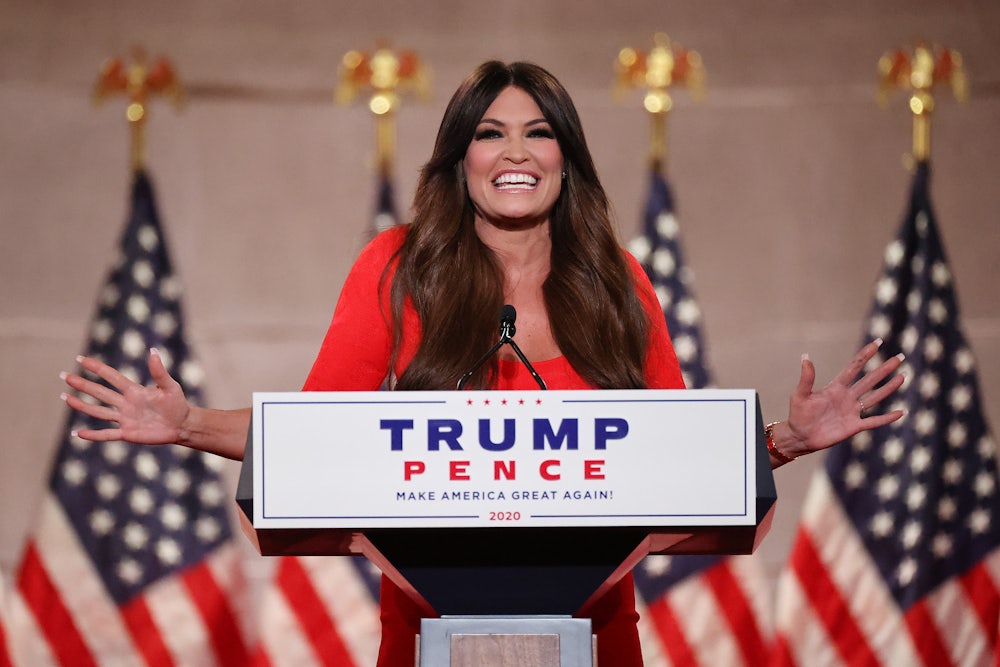The opening night of the Republican National Convention was a miserable pageant that tried in vain to insist that working people’s interests were at home in the party of big business and minoritarian rule. Around 25 million unemployed workers and their families are facing extreme hardship during a still-active pandemic and a catastrophic recession that economists now project will last for many more years, but the only nod to the crisis came when Trump convened a handful of frontline workers—a nurse, a trucker, a cop, a postal worker—to praise his response to the coronavirus one by one. (“We’re taking good care of our postal workers!” he cheerfully told one USPS employee.)
After that, workers were quickly dispensed, and the rest of the convention was handed over to right-wing politicians, the rich St. Louis couple now famous for brandishing both a large and a small gun at passing marchers—and presently obsessed with “Marxist activists”—and Donald Trump Jr. and his girlfriend, former Fox host Kimberly Guilfoyle. Despite a smattering of references to the working and middle classes by the various speakers, it was the dying gasp of the party’s incredibly feeble crack at twenty-first-century right-wing populism started by Trump in 2016.
One irony is that the ongoing economic distress, nationwide racial unrest, and wane of American power abroad make this moment terrifyingly ripe for a resurgence of Steve Bannon-style ethnonationalism; yet last night, Trump and the Republicans failed to offer much of anything other than hollow rhetoric and denunciations of the Democrats’ supposed slide toward Marxism. But just last week, Bannon, himself a millionaire many times over, was arrested aboard a luxury yacht owned by a Chinese billionaire and is now accused of pillaging money from a Gofundme established to raise funds for building a border wall to purchase a golf cart and plastic surgery, among other items.
Much like Bannon himself, though, last night’s convention extended a handful of superficial, cynical overtures to working people while at heart it was a love letter to a different part of the Republican base: affluent culture warriors, business interests looking for more tax cuts, and law enforcement groupies.
Over the last few years, the Republicans have had a strange run when it comes to styling themselves as champions of the working class. As journalist Christian Parenti has written in 2016, Trump’s particular manner of speaking contained just enough pro-worker flourishes that some listeners disillusioned with Washington elbow-rubbing and a declining standard of living could plausibly backfill a populist agenda into his speeches. Back then, Trump had pledged to safeguard Social Security and Medicare, end costly wars, lower drug prices, and reinvigorate American manufacturing, all measures that more than a few members of the Democratic elite had neglected for years. “Trump took the Bernie-style populism, emptied it of real class politics, reduced it to a jumble of affective associations, and used it to beat-up the smug liberals of the professional managerial class,” Parenti wrote. “It worked.”
With some help, of course, from the (decidedly non-populist) electoral college, it worked well enough to win an election. But four years later, with the country in deeper economic straits than it was even after the Great Recession, the Republican Party’s pitch to workers is thinner than ever. During his first term, Trump passed massive tax cuts for corporations and the wealthy while assembling a fiercely anti-worker National Labor Relations Board and working to slash the social safety net. More recently, he’s advocated a new payroll tax-deferral plan that would undermine the same Social Security program he once pledged to protect. The Republicans’ bizarre convention lineup—wealthy politicians, mansion-owners, and Trump family members—only further evince the fact that American right-wing populism is completely devoid of any actual legislation that might help workers.
Yesterday, Trump also made a surprise midday appearance right after the state delegate roll-call in which he unleashed his signature rambling that again demonstrated the incoherence of his vision for the working class. In one breath he praised Health and Human Services Secretary Alex Azar, a former pharmaceutical titan, then in the next decried the high price of prescription drugs in order to congratulate himself on completing a deal to lower prices. “The socialist countries have the lowest price, so I wanted to get the lowest price,” he said, but then, appearing to realize he was veering toward praising nationalized health care, shouted, “Other than that, our country will never be a socialist country!”
During that midday speech, you could also hear the familiar cries of “Drain the swamp!” from the audience (along with what sounded very much like a racist slur at one point when Obama’s name was invoked). But the Trump administration has perhaps been more waterlogged with lobbyists and private-sector interests than any before it. The conditions that gave rise to both the left and right-wing variants of populism in 2016 certainly haven’t vanished; they’ve only been exacerbated under Trump’s tenure. When the Democrats opened their arms (and pockets) to Wall Street and Silicon Valley with the consolidation of the Biden-Harris ticket, the Republicans had a brief, cynical chance to rush into the void with their own nightmarish version of populism. But the kickoff to their convention suggests that they, too, have mostly abandoned the pretense of working for the people.
